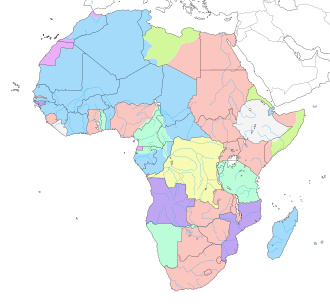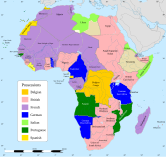Our website is made possible by displaying online advertisements to our visitors.
Please consider supporting us by disabling your ad blocker.
Scramble for Africa

The Scramble for Africa[a] was the conquest and colonisation of most of Africa by seven Western European powers driven by the Second Industrial Revolution during the era of "New Imperialism" (1833–1914): Belgium, France, Germany, United Kingdom, Italy, Portugal and Spain.
In 1870, 10% of the continent was formally under European control. By 1914, this figure had risen to almost 90%; the only states retaining sovereignty were Liberia, Ethiopia, Egba,[b] Aussa, Senusiyya,[2] Mbunda,[3] the Dervish State, and the Ovambo kingdoms,[4][5] most of which were later conquered.
The 1884 Berlin Conference regulated European colonisation and trade in Africa, and is seen as emblematic of the "scramble".[6] In the last quarter of the 19th century, there were considerable political rivalries between the European empires, which provided the impetus for the colonisation.[7] The later years of the 19th century saw a transition from "informal imperialism" – military influence and economic dominance – to direct rule.[8]
With the decline of the European colonial empires in the wake of the two world wars, most African colonies gained independence during the Cold War, and decided to keep their colonial borders in the Organisation of African Unity conference of 1964 due to fears of civil wars and regional instability, placing emphasis on pan-Africanism.[9]
Cite error: There are <ref group=lower-alpha> tags or {{efn}} templates on this page, but the references will not show without a {{reflist|group=lower-alpha}} template or {{notelist}} template (see the help page).
- ^ Daly, Samuel Fury Childs (4 May 2019). "From Crime to Coercion: Policing Dissent in Abeokuta, Nigeria, 1900–1940". The Journal of Imperial and Commonwealth History. 47 (3): 474–489. doi:10.1080/03086534.2019.1576833. ISSN 0308-6534. S2CID 159124664.
- ^ Hadaway, Stuart (2014). Pyramids and Fleshpots: The Egyptian, Senussi and Eastern Mediterranean Campaigns (1914–1916). The History Press. ISBN 978-0-7509-5808-0.
- ^ Association, Cheke Cultural Writers (1994). "Chapter 14: The Kolongongo War Against the Portuguese". The history and cultural life of the Mbunda speaking peoples. The Association. ISBN 9789982030069.
- ^ Williams, Frieda-Nela (1991). Precolonial Communities of Southwestern Africa: A history of Owambo Kingdoms 1600–1920 (PDF). National Archives of Namibia. Archived (PDF) from the original on 7 March 2024. Retrieved 7 March 2024.
- ^ Fokkens, Andries (2023). "The ovamboland expedition of 1917: the deposing of King Mandume". Small Wars & Insurgencies. 34 (2): 382–421. doi:10.1080/09592318.2022.2153468.
- ^ Brantlinger 1985, pp. 166–203.
- ^ Robinson, Gallagher & Denny 1961, p. 175.
- ^ Shillington 2005, p. 301.
- ^ Touval, Saadia (1967). "The Organization of African Unity and African Borders". International Organization. 21 (1): 102–127. doi:10.1017/S0020818300013151. JSTOR 2705705.
Previous Page Next Page




